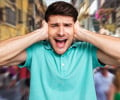It's the latest wrinkle in research toward finding a pill that will help protect and even treat hearing loss from exposure to loud noise. While the effort is hardly new, experts say it has picked up steam in just the past few years.
Starting in a few months, a group of 600 Marines will face rifle training with not only foam plugs in their ears, but also a drink that tastes very much like herbal tea.They'll take it with every meal during their two weeks of the noisy training, an experience that normally erodes a bit of hearing ability from about 10 percent of trainees. And if all goes as hoped, hearing tests will show that a substance dissolved in the drink made a difference.
Noise-induced hearing loss is one of the most common occupational diseases and the second most self-reported occupational illness or injury. About 10 million Americans have permanent hearing loss from loud noise, either a long-term exposure or in a sudden burst like an explosion. And an estimated 30 million people are thought to be exposed to hazardous levels of noise at work, such as in mining, construction, manufacturing and agriculture.
Earplugs not always enough
Nor is the problem just in the workplace. Hobbies like recreational shooting, motorcycling and snowmobiling pose a risk, too.
Earplugs and specialized sound-deadening earmuffs are clearly helpful, but they're not always enough. Some sounds overwhelm them. Some people don't wear them when they should, and other people are unusually susceptible to hearing damage. And some sound levels can damage hearing by going through the skull, no matter what's protecting the ears.
"Noise-induced hearing loss is such a common cause of hearing loss, and we haven't been very effective in ways to manage it", said Sharon Kujawa, director of audiology at the Massachusetts Eye and Ear Infirmary.
Advertisement
Scientists have pursued a variety of approaches toward an ear-fortifying pill. In 1994, for example, Israeli researchers reported that magnesium supplements helped military recruits avoid hearing loss over two months of noisy basic training. These days, much of the work focuses on antioxidants, the chemical class that most famously includes vitamins C and E.
Advertisement
In that case, damage from the free radicals leads to death of the ear's sound receptors -- hair cells, which convert the mechanical energy of incoming sound waves into nerve messages to the brain. As hair cells die off, hearing erodes permanently. So it makes sense to try to build up the ear's antioxidant defenses as a preventive step, and as a fast treatment after noise exposure.
Antioxidants should work best if given prior to noise exposure, but animal work suggests it might reduce permanent hearing loss substantially if given within four to eight hours afterward, say researchers.
Researchers , who are involved in the test with the Marines, and other scientists have gotten encouraging results in animal work from a variety of antioxidant compounds and they are now focusing on one called N-acetylcysteine or NAC, which is already approved by federal authorities for treating overdoses of the painkiller Tylenol.
NAC not only neutralizes free radicals but also bolsters the ear's own antioxidant defenses. In the upcoming federally funded experiment with the Marines, half will get NAC in their flavored drink and the other half won't. Then researchers will see if the first group fares better.
Some experts are cautious about the antioxidant approach. It makes sense the substances could reduce hearing loss if given before noise exposure, but the animal studies so far haven't varied the combination of noise levels and antioxidant doses enough to indicate how useful that might be in people.
So while the research goes on, should people take antioxidants like vitamins A or E to protect their hearing from noise damage? Is the question that remains unanswered.









